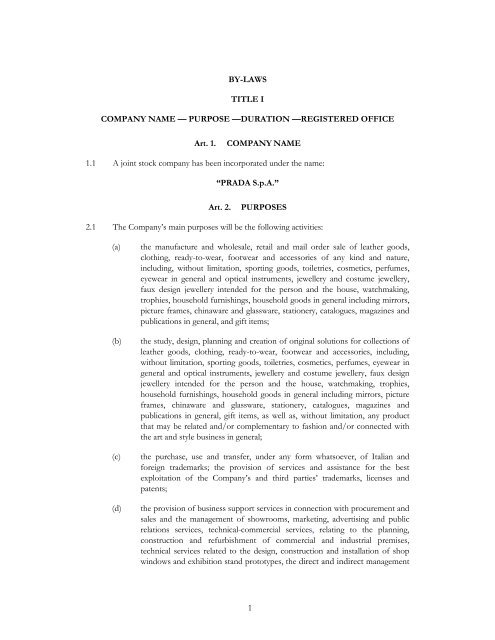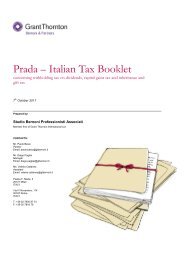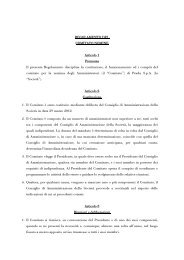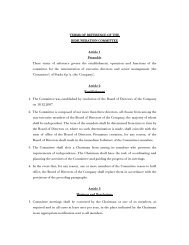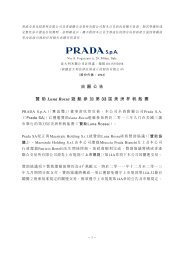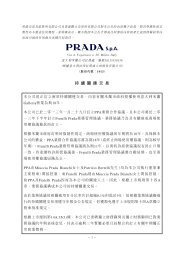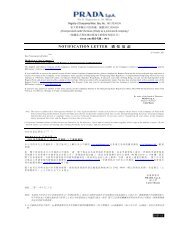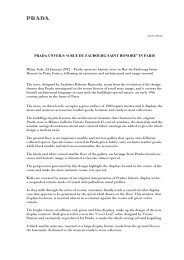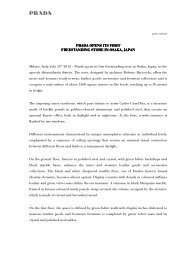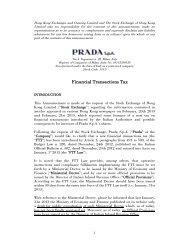by-laws title i company name — purpose —duration - Prada Group
by-laws title i company name — purpose —duration - Prada Group
by-laws title i company name — purpose —duration - Prada Group
You also want an ePaper? Increase the reach of your titles
YUMPU automatically turns print PDFs into web optimized ePapers that Google loves.
BY-LAWS<br />
TITLE I<br />
COMPANY NAME <strong>—</strong> PURPOSE <strong>—</strong>DURATION <strong>—</strong>REGISTERED OFFICE<br />
Art. 1. COMPANY NAME<br />
1.1 A joint stock <strong>company</strong> has been incorporated under the <strong>name</strong>:<br />
“PRADA S.p.A.”<br />
Art. 2. PURPOSES<br />
2.1 The Company’s main <strong>purpose</strong>s will be the following activities:<br />
(a) the manufacture and wholesale, retail and mail order sale of leather goods,<br />
clothing, ready-to-wear, footwear and accessories of any kind and nature,<br />
including, without limitation, sporting goods, toiletries, cosmetics, perfumes,<br />
eyewear in general and optical instruments, jewellery and costume jewellery,<br />
faux design jewellery intended for the person and the house, watchmaking,<br />
trophies, household furnishings, household goods in general including mirrors,<br />
picture frames, chinaware and glassware, stationery, catalogues, magazines and<br />
publications in general, and gift items;<br />
(b) the study, design, planning and creation of original solutions for collections of<br />
leather goods, clothing, ready-to-wear, footwear and accessories, including,<br />
without limitation, sporting goods, toiletries, cosmetics, perfumes, eyewear in<br />
general and optical instruments, jewellery and costume jewellery, faux design<br />
jewellery intended for the person and the house, watchmaking, trophies,<br />
household furnishings, household goods in general including mirrors, picture<br />
frames, chinaware and glassware, stationery, catalogues, magazines and<br />
publications in general, gift items, as well as, without limitation, any product<br />
that may be related and/or complementary to fashion and/or connected with<br />
the art and style business in general;<br />
(c) the purchase, use and transfer, under any form whatsoever, of Italian and<br />
foreign trademarks; the provision of services and assistance for the best<br />
exploitation of the Company’s and third parties’ trademarks, licenses and<br />
patents;<br />
(d) the provision of business support services in connection with procurement and<br />
sales and the management of showrooms, marketing, advertising and public<br />
relations services, technical-commercial services, relating to the planning,<br />
construction and refurbishment of commercial and industrial premises,<br />
technical services related to the design, construction and installation of shop<br />
windows and exhibition stand prototypes, the direct and indirect management<br />
1
of services relating to sports, cultural and artistic activities in general, services<br />
relating to the organisation of exhibitions and conventions, including on a<br />
turn-key basis, the direct or indirect management of catering services, services<br />
related to administrative management, personnel management, technical, IT,<br />
data research and data processing services, as well as all other activities<br />
functionally connected to the stated <strong>purpose</strong>s, including the acquisition and<br />
concession of franchises.<br />
2.2 The Company may also carry out, in the interest of its subsidiaries or affiliates, any<br />
activity connected with or incidental to its activities or those of the subsidiaries or<br />
affiliates. To this end the Company may, in particular:<br />
coordinate the managerial resources of its subsidiaries or affiliates, including<br />
through suitable training initiatives;<br />
coordinate the administrative and financial operations of its subsidiaries or affiliates,<br />
as well as perform all appropriate operations in their favour, including the provision<br />
of financing;<br />
provide other services in favour of its subsidiaries or affiliates in areas of specific<br />
business interest.<br />
2.3 The Company may also carry out operations involving financial, movables, real estate<br />
and commercial transactions considered to be necessary <strong>by</strong> the board of directors or<br />
useful for the achievement of the Company’s <strong>purpose</strong>s; the Company may acquire,<br />
manage and dispose of shareholdings or interests in companies and enterprises of any<br />
kind, with similar or connected <strong>purpose</strong>s and grant to third parties endorsements,<br />
suretyships and other guarantees, including security, as long as they are useful or<br />
necessary for the achievement of the Company’s <strong>purpose</strong>s.<br />
2.4 The activities mentioned above shall be carried out within the limits and in accordance<br />
with the law applicable from time to time and, in particular, investment activities<br />
exercised vis-à-vis the public as well as the activities in general reserved <strong>by</strong> law to<br />
professional members enrolled in specific registers are excluded.<br />
Art. 3. DURATION<br />
3.1 The duration of the Company is until 31 January 2100.<br />
3.2 The duration of the Company may be extended one or more times <strong>by</strong> a resolution of<br />
the shareholders’ meeting.<br />
Art. 4. REGISTERED OFFICE<br />
4.1 The registered office of the Company will be in Milan, Italy.<br />
4.2 The Company may open, change or close, establish or wind up branch offices,<br />
subsidiaries, representative offices, agencies and offices in general, in Italy and abroad.<br />
2
Art. 5. DOMICILE<br />
5.1 For the <strong>purpose</strong>s of their relations with the Company, the domicile of all shareholders,<br />
directors, statutory auditors and the external auditor will be the location of their<br />
address as it appears in the Company’s books.<br />
TITLE II<br />
STOCK CAPITAL AND SHARES - BONDS - ALLOCATED ASSETS - LOANS -<br />
RIGHT TO WITHDRAW<br />
Art. 6. STOCK CAPITAL AND SHARES<br />
6.1 The stock capital of the Company is EUR 255,882,400 (two hundred fifty five million<br />
eight hundred eighty-two thousand and four hundred) fully paid-up, represented <strong>by</strong><br />
2,558,824,000 (two billion five hundred fifty eight million eight hundred twenty four<br />
thousand) ordinary shares each with a nominal value of EUR 0.10 (ten cents).<br />
6.2 The shares will be registered and every share en<strong>title</strong>s the holder to one vote.<br />
6.3 The fact of being a shareholder in itself constitutes the agreement of each shareholder<br />
to be bound <strong>by</strong> these <strong>by</strong>-<strong>laws</strong>.<br />
Art. 7. BONDS<br />
7.1 The Company may issue convertible and non-convertible bonds within the limits<br />
established under Section 2412 of the Italian Civil Code.<br />
Art. 8. ALLOCATED ASSETS<br />
8.1 The Company may allocate certain assets to a specific business transaction pursuant to<br />
Sections 2447-bis and the following provisions of the Italian Civil Code.<br />
Art. 9. LOANS FROM SHAREHOLDERS<br />
9.1 The Company may obtain interest-bearing or non-interest bearing loans from its<br />
shareholders, with or without a repayment obligation, in compliance with applicable<br />
<strong>laws</strong> and regulations.<br />
Art. 10. RIGHT TO WITHDRAW<br />
10.1 The right to withdraw from the Company shall be regulated <strong>by</strong> the Italian Civil Code.<br />
The right to withdraw cannot be exercised <strong>by</strong> shareholders who do not vote in favour<br />
of resolutions that are passed regarding: (i) the extension of the Company’s duration, or<br />
(ii) the introduction or removal of any burden relating to the circulation of the shares.<br />
3
TITLE III<br />
SHAREHOLDERS’ MEETINGS<br />
Art. 11. AUTHORITY OF THE ORDINARY SHAREHOLDERS’ MEETING<br />
11.1 The shareholders in an ordinary shareholders’ meeting will resolve on matters that are<br />
reserved to them under applicable <strong>laws</strong> and regulations and these <strong>by</strong>-<strong>laws</strong>. In particular,<br />
the shareholders in an ordinary shareholders’ meeting shall resolve on the following<br />
matters:<br />
(a) approval of the financial statements and the distribution of profits;<br />
(b) election and removal of the directors, election of the statutory auditors and<br />
their chairman and, whenever required, of the external auditor;<br />
(c) compensation of directors and statutory auditors, as well as of the external<br />
auditor;<br />
(d) determination of the liability of directors and statutory auditors;<br />
(e) the purchase of the Company’s shares within the limit set forth <strong>by</strong> art. 2357,<br />
first paragraph, of the Italian Civil Code and, in any case, within the limit of<br />
10% of the issued share capital at the time of the relevant shareholders’<br />
meeting;<br />
(f) the approval of the regulations for the conduct of shareholders’ meetings;<br />
(g) any other matters reserved to them <strong>by</strong> applicable <strong>laws</strong> and regulations, as well<br />
as any authorization required under these <strong>by</strong>-<strong>laws</strong> or <strong>by</strong> applicable <strong>laws</strong> and<br />
regulations for the performance of directors’ actions.<br />
Art. 12. AUTHORITY OF THE EXTRAORDINARY SHAREHOLDERS’<br />
MEETING<br />
12.1 The shareholders in an extraordinary shareholders’ meeting will resolve on the<br />
following matters:<br />
(a) any amendment to these <strong>by</strong>-<strong>laws</strong>;<br />
(b) the appointment and replacement of liquidators and the determination of their<br />
powers; and<br />
(c) any other matters reserved to shareholders in an extraordinary shareholders’<br />
meeting <strong>by</strong> applicable <strong>laws</strong> and regulations.<br />
Art. 13. LOCATION AND FREQUENCY OF THE SHAREHOLDERS’ MEETING<br />
13.1 The ordinary and extraordinary shareholders’ general meetings will normally be held in<br />
4
the municipality where the registered office of the Company is located, except as<br />
otherwise resolved <strong>by</strong> the board of directors, provided always that such shareholders’<br />
general meeting will be held in Italy, or in a country where the Company, directly or<br />
indirectly through its subsidiaries or affiliates, carries out its business activities.<br />
13.2 The ordinary shareholders’ general meetings must be convened at least once a year for<br />
the approval of the financial statements, within one hundred and twenty days (120)<br />
after the end of the financial year, or within one hundred and eighty days (180) after the<br />
end of the financial year if the Company is required to draw up consolidated financial<br />
statements or, in any case, when it is required <strong>by</strong> the particular circumstances relating to<br />
the structure and <strong>purpose</strong> of the Company. No more than 15 months shall elapse in<br />
any case between the date of one such ordinary shareholders’ general meeting and the<br />
next.<br />
Art. 14. CALL OF THE SHAREHOLDERS’ MEETING<br />
14.1 An ordinary general shareholders’ meeting may be called <strong>by</strong> the board of directors<br />
whenever it deems it appropriate and in the circumstances specified <strong>by</strong> applicable <strong>laws</strong><br />
and regulations.<br />
14.2 A shareholders’ meeting may also be called when requested <strong>by</strong> shareholders<br />
representing at least one-twentieth of the share capital, provided the request mentions<br />
the item or items to be discussed at the meeting and save for the limits set out in the<br />
last paragraph of Section 2367 of the Italian Civil Code. If there is an unjustified delay<br />
in calling the meeting, action will be taken <strong>by</strong> the board of statutory auditors.<br />
14.3 The shareholders’ meetings is convened <strong>by</strong> means of a notice of call specifying, in<br />
addition to the information required <strong>by</strong> <strong>laws</strong> and regulations, all information relating to<br />
any interest held <strong>by</strong> any of the directors on their behalf, or on behalf of third parties,<br />
specifying the effects that this resolution might have on them as shareholders of the<br />
Company and whether these effects differ from those that might affect all other<br />
shareholders.<br />
14.4 The notice of call must be published in accordance with the procedures provided <strong>by</strong><br />
applicable Italian law at least thirty days before the date of the meeting on (i) at least<br />
one of the following newspapers: “Il Sole 24Ore”, “Italia Oggi”, “MF Milano Finanza”<br />
and (ii) on the Company’s website.<br />
The notice periods mentioned above under letter (a) shall be extended to the fortieth<br />
day before the date of the meeting for those meetings providing for the appointment<br />
of directors and statutory auditors, and (b) postponed to the twenty-first day before the<br />
date of the meeting for those meetings provided under Sections 2446 (Reduction of<br />
capital pursuant to losses), 2447 (Reduction of capital below the legal minimum) and<br />
2487 of the Italian Civil Code (Appointment and replacement of liquidators).<br />
14.5 Shareholders who, individually or jointly, own or control at least one-fortieth of the<br />
share capital may request, within ten days as of the publication of the notice of call<br />
pursuant to paragraph 14.4 above (five days in the circumstances indicated under<br />
5
paragraph 14.4(b)), additions to the list of items on the agenda setting out the proposed<br />
additions. Requests must be submitted in writing. Additions to the agenda submitted<br />
pursuant to this paragraph shall be disclosed according to applicable <strong>laws</strong>. Additions to<br />
the agenda cannot be made for matters which, in accordance with law, the<br />
shareholders’ meeting should resolve upon only after a proposal <strong>by</strong> the board of<br />
directors or on the basis of a project or report prepared <strong>by</strong> the directors, other than the<br />
report relating to items included in the agenda.<br />
Art. 15. RIGHTS RELATING TO THE SHARES<br />
15.1 The right to attend and to vote at shareholders’ meetings shall be determined in<br />
pursuance of these <strong>by</strong>-<strong>laws</strong> and, when not expressly provided for, <strong>by</strong> applicable law in<br />
force from time to time.<br />
15.2 Any person who is en<strong>title</strong>d to vote at the shareholders’ meeting can be represented <strong>by</strong> a<br />
proxy or representative. If any person recorded as legal owner of any shares acts as a<br />
registered trustee, on behalf of his/her customers, or in any case on behalf of third<br />
parties, the person in question may indicate others on whose behalf he/she acts, or one<br />
or more third parties indicated <strong>by</strong> such customer, as their proxies or representatives.<br />
15.3 Where any shareholder is required <strong>by</strong> applicable <strong>laws</strong> and regulations to abstain from<br />
voting on any particular resolution, any votes cast <strong>by</strong> or on behalf of such shareholder<br />
in contravention of such requirement or restriction shall not be counted. On the<br />
contrary, nothing shall prevent such shareholder from counting in the quorum at the<br />
relevant ordinary or extraordinary shareholders’ meeting.<br />
15.4 If the shares of the Company are listed on a market which provides for the distinction<br />
between legal ownership and beneficial ownership, the exercise of the rights pertaining<br />
to the shareholders will be permitted, with the prior authorisation of the legal owner, to<br />
the beneficial owners to the fullest extent allowed <strong>by</strong> the applicable regulations.<br />
Art. 16. CHAIRMAN AND SECRETARY OF THE MEETING<br />
16.1 Shareholders’ meetings shall be presided over <strong>by</strong> the chairman of the board of directors<br />
or, in his/her absence, <strong>by</strong> the deputy chairman or <strong>by</strong> the chief executive officer, if one<br />
is appointed. In the absence of the persons mentioned above, the shareholders’<br />
meeting shall appoint, with the majority of the capital represented, the person who will<br />
act as chairman of the shareholders’ meeting. The chairman of the shareholders’<br />
meeting will be assisted <strong>by</strong> a secretary, appointed <strong>by</strong> the shareholders’ meeting, who<br />
does not need to be a shareholder, and, if required, <strong>by</strong> two scrutineers. If required <strong>by</strong><br />
the applicable law or <strong>by</strong> the shareholders’ meeting a notary public will attend and draft<br />
the minutes.<br />
16.2 In any event the minutes will be drawn up in accordance with Section 2375 of the<br />
Italian Civil Code.<br />
16.3 The chairman of the meeting, who can also avail himself of assistants, (i) will confirm<br />
the right to attend, also <strong>by</strong> proxy, of those present; (ii) will ascertain that the meeting is<br />
6
properly held and is en<strong>title</strong>d to consider the resolutions; (iii) will supervise and direct<br />
the meeting, also <strong>by</strong> deciding the order of items on the agenda that have to be<br />
discussed; (iv) will direct the discussions and decide the manner of voting; (v) and will<br />
ascertain and proclaim the results of the voting.<br />
16.4 Conduct of the shareholders’ meeting is ruled <strong>by</strong> the relevant regulation approved <strong>by</strong><br />
the ordinary shareholders’ meeting.<br />
Art. 17. DETERMINATION OF THE QUORUM<br />
17.1 The ordinary and the extraordinary shareholders’ meeting is normally held in one call,<br />
unless the board of directors, for a specific meeting, resolves to provide a date for the<br />
second and the third call, with disclosure in the notice of call.<br />
17.2 Without prejudice to the provisions set forth <strong>by</strong> Title VII of these <strong>by</strong>-<strong>laws</strong> in the case<br />
where the shares of the Company will be traded on the Stock Exchange of Hong<br />
Kong, the quorum for an ordinary and extraordinary shareholders’ meeting is provided<br />
under the Italian Civil Code.<br />
17.3 Voting <strong>by</strong> secret ballot is not allowed. The chairman will determine which of the<br />
following procedures shall be adopted: (i) ballot; or (ii) electronic voting system. Voting<br />
<strong>by</strong> a show of hands is not permitted.<br />
17.4 If provided for in the notice that called the meeting, those persons en<strong>title</strong>d to vote may<br />
attend the shareholders’ meeting through telecommunication equipment, and exercise<br />
their right to vote <strong>by</strong> electronic means, in accordance with the Italian Civil Code, the<br />
regulatory provisions on this subject and the shareholders’ meeting regulation.<br />
TITLE IV<br />
ADMINISTRATION - REPRESENTATION - CONTROL<br />
Art. 18. BOARD OF DIRECTORS<br />
18.1 The Company is managed <strong>by</strong> a board of directors vested with full powers for the<br />
ordinary and extraordinary management without any exception whatsoever and, in<br />
particular, has the power to perform all acts it deems advisable for the implementation<br />
and achievement of the corporate <strong>purpose</strong>s set out above, except for the acts reserved<br />
<strong>by</strong> law or <strong>by</strong> the <strong>by</strong>-<strong>laws</strong> for a shareholders’ meeting.<br />
18.2 The directors are not bound to comply with the non-competition obligations under<br />
Section 2390 of the Italian Civil Code.<br />
Art. 19. ELECTION AND REPLACEMENT OF THE BOARD OF DIRECTORS<br />
19.1 The Company is managed <strong>by</strong> a board of directors consisting of no fewer than nine and<br />
no more than eleven members. The shareholders’ meeting will determine the number<br />
of directors within these limits. The directors are appointed <strong>by</strong> the shareholders’<br />
7
general meeting for a period of up to three financial years. This term lapses on the date<br />
of the shareholders’ meeting called to approve the financial statements for the last year<br />
of their office. They may be reappointed.<br />
19.2 Each director must satisfy the requirements for his/her eligibility, proficiency and<br />
integrity in accordance with applicable <strong>laws</strong>. At least three directors, or the higher<br />
number required <strong>by</strong> the applicable <strong>laws</strong> and regulations, if any, must satisfy the<br />
independence requirements set forth <strong>by</strong> the corporate governance code approved <strong>by</strong><br />
the Corporate Governance committee of Borsa Italiana S.p.A. or, if the shares of the<br />
Company are listed on the Stock Exchange of Hong Kong, the requirements set forth<br />
<strong>by</strong> the <strong>laws</strong> and regulations applicable therein to the Company in relation to the<br />
independence of directors.<br />
19.3 Any person who, alone or together with others, represents at least 1% of the share<br />
capital may propose one or more candidates, up to eleven, <strong>by</strong> filing the <strong>name</strong> of such<br />
candidates with the Company at its registered office at least twenty-five days prior to<br />
the date of the shareholders’ meeting called to resolved upon their appointment on the<br />
first or single call. The details of the candidates are to be published in accordance with<br />
the applicable Italian regulations and if the shares of the Company are listed on the<br />
Stock Exchange of Hong Kong, the requirements set forth <strong>by</strong> the <strong>laws</strong> and regulations<br />
applicable therein.<br />
19.4 Together with the nomination mentioned in Art. 19.3 above, the proposing person(s)<br />
are also required, on penalty of inadmissibility, to file: (a) the list of the proposing<br />
person(s), specifying the number of shares of the Company held <strong>by</strong> each of them,<br />
accompanied <strong>by</strong> evidence attesting compliance with the minimum threshold required<br />
under Art. 19.3, (b) the curriculum vitae of each candidate, (c) confirmations from each<br />
candidate accepting his/her nomination and attesting, in his/her own responsibility,<br />
that there are no grounds for his/her ineligibility and incompatibility to act as a director<br />
and that he/she satisfies the aforementioned integrity and, if applicable, independence<br />
requirements.<br />
19.5 If the number of candidates satisfying the independence requirements pursuant to the<br />
previous paragraphs is lower than the minimum number set out under Art. 19.2., the<br />
board of directors shall submit to the shareholders’ meeting a sufficient number of<br />
candidates that satisfy the abovementioned characteristics in order to reach the<br />
minimum number provided under Art. 19.2.<br />
19.6 The directors shall be appointed as follows:<br />
(a) the shareholders’ meeting first determines the number of directors;<br />
(b) a vote shall be taken in respect of every single candidate presented pursuant to the<br />
articles above.<br />
19.7 The candidates are to be divided into two slates: the first one will list candidates who<br />
comply with the independence requirements set out under Art. 19.2 above in numerical<br />
order according to the number of votes received <strong>by</strong> each of them (“Slate A”); the<br />
second one will list the other candidates in numerical order according to the number of<br />
8
votes received <strong>by</strong> each of them (“Slate B”).<br />
19.8 The first three candidates - or the higher number required in order to satisfy the<br />
minimum threshold set out under Art. 19.2 - in Slate A and the first candidates listed in<br />
Slate B in the number necessary to reach the number of directors set forth <strong>by</strong> the<br />
shareholders’ meeting pursuant to Art. 19.6(a) above will be appointed.<br />
19.9 Directors for any reason not appointed pursuant to the aforementioned procedure will<br />
be appointed <strong>by</strong> the shareholders’ meeting, with the majorities prescribed <strong>by</strong> the law, in<br />
such a way as to ensure that the composition of the board of directors complies with<br />
applicable <strong>laws</strong> and regulations and the <strong>by</strong>-<strong>laws</strong>.<br />
19.10 The appointed directors must communicate to the Company if they have lost any of<br />
the abovementioned independence and integrity requirements or if any situations of<br />
ineligibility or incompatibility have arisen.<br />
19.11 The board of directors will periodically evaluate the independence and integrity of its<br />
members. If the integrity or independence requirements set forth <strong>by</strong> the legislation are<br />
not satisfied or are no longer applicable to a director or if situations of ineligibility or<br />
incompatibility have arisen, the board of directors will declare the director’s<br />
disqualification and resolve upon his/her substitution or shall invite him/her to rectify<br />
the situation of incompatibility within the term set <strong>by</strong> the board of directors itself, on<br />
penalty of his/her disqualification.<br />
19.12 The shareholders’ meeting may, even during the board of directors’ term of office,<br />
change the number of members of the board of directors, always within the limits set<br />
forth under Art. 19.1, and make the related appointments. The mandates of directors<br />
so elected will expire at the same time as those of the directors who are already serving.<br />
19.13 If during the term of office one or more directors should no longer hold office, action<br />
will be taken in compliance with Section 2386 of the Italian Civil Code. If a majority of<br />
directors should cease to hold office, the whole board of directors will be considered to<br />
have resigned and the board must promptly call a shareholders’ meeting to appoint a<br />
new board of directors.<br />
Art. 20. THE CHAIRMAN OF THE BOARD OF DIRECTORS<br />
20.1 If the shareholders’ meeting has not appointed a chairman, the board of directors will<br />
elect one among its members.<br />
20.2 The board of directors, at the chairman’s proposal, is to appoint a secretary who does<br />
not need to be employed <strong>by</strong> the Company.<br />
20.3 The board of directors can appoint a deputy chairman with the power to deputise for<br />
the chairman in his/her absence.<br />
20.4 The chairman of the board of directors or, when it is impossible for the chairman,<br />
whoever acts in his/her place will call the meetings of the board of directors, establish<br />
the agenda, coordinate the meeting and ensure that all directors are fully acquainted<br />
9
with the items on the agenda.<br />
Art. 21. DELEGATED BODIES<br />
21.1 The board of directors may delegate - within the limits established <strong>by</strong> Section 2381 of<br />
the Italian Civil Code and <strong>by</strong> these <strong>by</strong>-<strong>laws</strong> - part of its authorities to one or more of its<br />
members, and determine their powers and related remuneration.<br />
21.2 The board of directors may also establish an executive committee which must include<br />
some but not all of the members of the board of directors as well as the chairman and<br />
any directors with delegated powers. When resolving on the creation of an executive<br />
committee, the board of directors may determine the <strong>purpose</strong>s and manner of exercise<br />
of the delegated authorities.<br />
21.3 The board of directors shall nevertheless retain the power to supervise and perform<br />
directly any transactions falling within its delegated powers, as well as retaining the<br />
power to revoke any delegated bodies.<br />
21.4 The delegated bodies shall report to the board of directors and the board of statutory<br />
auditors at least once every six months.<br />
21.5 In addition, decisions concerning the following matters are reserved for the<br />
competence of the board of directors, which cannot delegate such powers:<br />
merger and proportional demerger (scissione proporzionale) of companies in which<br />
the Company owns shares or holdings that represent at least 90 percent of share<br />
capital;<br />
establishment and winding-up of branch offices;<br />
indication of which directors shall be given the power to act as the legal<br />
representative of the Company;<br />
reduction of the share capital in the event of exercise of withdrawal rights <strong>by</strong> one<br />
or more shareholders;<br />
amendment of the <strong>by</strong>-<strong>laws</strong> to reflect changes that need to be made under Italian<br />
<strong>laws</strong>; and<br />
transfer of the Company’s registered office within Italy.<br />
21.6 The board of directors may appoint general managers and determine their powers.<br />
21.7 If required <strong>by</strong> applicable <strong>laws</strong>, the board of directors shall appoint, with the favourable<br />
opinion of the board of statutory auditors, a manager responsible for the preparation<br />
of the financial reporting documents. Such manager must be chosen from among those<br />
persons who, for at least three years, have carried out: (a) audit, administration, control<br />
or senior management activities in large companies (i.e. companies with a share capital<br />
of at least EUR 2,000,000), or (b) professional activities or university teaching activities<br />
10
in the financial or accounting sectors.<br />
21.8 The board of directors may establish committees to consult and make proposals on<br />
specific subjects.<br />
Art. 22. BOARD OF DIRECTORS’ MEETINGS AND RESOLUTIONS<br />
22.1 The board of directors will meet in the place indicated in the meeting notice, in the<br />
municipality where the registered office of the Company is located or where the<br />
Company, directly or indirectly through its subsidiaries or affiliates, carries out its<br />
business activities. The board of directors will meet each time the chairman, the board<br />
of statutory auditors or at least one-third of the directors deem it necessary.<br />
22.2 A meeting of the board of directors will be called at least five days before the date<br />
established for the meeting <strong>by</strong> notice of call to be sent to each director and to the<br />
statutory auditors <strong>by</strong> registered mail, fax or e-mail. The notice period is 24 hours in<br />
cases of urgency.<br />
22.3 A meeting of the board of directors shall be validly held if the majority of the directors<br />
in office are present and can pass resolutions with the favourable vote of the majority<br />
of those present. Where a director abstains from voting or has declared to have a<br />
conflict, he/she will not be counted in determining the quorum required for approval<br />
of the relevant resolution.<br />
22.4 Voting <strong>by</strong> proxy at board meetings is not allowed. A director must inform the other<br />
directors and the board of statutory auditors if he/she has any conflict of interest either<br />
on his/her own behalf or as a result of his/her connections with third persons in a<br />
specific transaction of the Company and, in that case, he/she shall abstain from voting.<br />
22.5 A meeting of the board of directors will be validly held, even if not formally called,<br />
whenever all directors in office and all members of the board of statutory auditors are<br />
present.<br />
22.6 A meeting of the board of directors shall also be validly held if those present are<br />
located in different places, wherever situated, connected <strong>by</strong> audio/visual means, if each<br />
of the participants in the meetings can be identified and if each can follow and<br />
participate in the discussion of the topics dealt with in real time. The meeting is<br />
considered validly held in the place indicated in the meeting notice.<br />
22.7 Board meetings shall be chaired <strong>by</strong> the chairman or, if the latter is absent, <strong>by</strong> the<br />
deputy chairman (if appointed). If the latter is also absent, the board meetings are to be<br />
chaired <strong>by</strong> the oldest executive director or, if no executive director is present, <strong>by</strong> any<br />
director designated <strong>by</strong> the other attending directors.<br />
Art. 23. POWER TO REPRESENT THE COMPANY<br />
23.1 The power legally to represent the Company is vested with the chairman of the board<br />
of directors.<br />
11
23.2 The power legally to represent the Company shall also be vested with those directors<br />
who have been duly authorised <strong>by</strong> the board of directors, within the limits of the<br />
delegated authorities.<br />
Art. 24. REMUNERATION OF DIRECTORS<br />
24.1 The directors are en<strong>title</strong>d to be reimbursed for the costs sustained <strong>by</strong> reason of their<br />
office and to receive remuneration established <strong>by</strong> the shareholders’ meeting.<br />
24.2 The remuneration of directors vested with special authorities shall be established <strong>by</strong> the<br />
board of directors, after having heard the opinion of the board of statutory auditors.<br />
24.3 The shareholders’ meeting may allocate an aggregate sum for the remuneration of all<br />
directors, including those vested with special authorities.<br />
Art. 25. BOARD OF STATUTORY AUDITORS<br />
25.1 The board of statutory auditors shall supervise compliance with all applicable <strong>laws</strong>,<br />
regulations and these <strong>by</strong>-<strong>laws</strong> and with the correct management principles and,<br />
specifically, it shall ensure that the organisation, administrative and accounting<br />
structure adopted <strong>by</strong> the Company is adequate and appropriate and actually functions.<br />
25.2 The ordinary shareholders’ meeting is to elect a board of statutory auditors comprising<br />
three statutory and two alternate statutory auditors, appoints the chairman of the board<br />
of statutory auditors and determines the remuneration of the statutory auditors for<br />
their entire term of office.<br />
25.3 Any person who, alone or together with others, represents at least 1% of the share<br />
capital of the Company may propose one or more candidates, up to three statutory and<br />
two alternate auditors, <strong>by</strong> filing the <strong>name</strong> of such candidates at the registered office of<br />
the Company at least twenty-five days prior to the date of the shareholders’ meeting<br />
called to resolved upon their appointment on first or single call. At least one candidate<br />
of the statutory auditors and one candidate of the alternate auditors must be a<br />
chartered accountant and have carried out audit activities for no less than three years.<br />
The <strong>name</strong>s of the candidates are to be published in accordance with the applicable law<br />
in force from time to time.<br />
25.4 Together with the nomination mentioned in the article above, the proposing person(s)<br />
are also required, on penalty of inadmissibility, to file: (a) the list of the proposing<br />
person(s), specifying the number of shares of the Company held <strong>by</strong> each of them,<br />
accompanied <strong>by</strong> evidence attesting compliance with the minimum threshold requested<br />
<strong>by</strong> Art. 25.3; (b) the curriculum vitae of each candidate, (c) confirmation from each<br />
candidate accepting his/her nomination and attesting, in his/her own responsibility,<br />
that there are no grounds for his/her ineligibility and incompatibility to act as a<br />
statutory auditor and that he/she satisfies the aforementioned integrity and, if<br />
applicable, independence requirements; (d) the list of the offices as a member of the<br />
board of directors or the board of statutory auditors held <strong>by</strong> the candidate auditor in<br />
other companies.<br />
12
25.5 The candidates shall be divided into two slates: the first (“Slate C”) containing the<br />
<strong>name</strong>s of those candidates for appointment as effective auditors and the second (“Slate<br />
D”) containing the <strong>name</strong>s of those candidates for appointment as alternate auditors.<br />
Every single <strong>name</strong> submitted is to be voted on separately.<br />
25.6 The three candidates drawn out from Slate C who receive the majority of votes<br />
expressed <strong>by</strong> the shareholders will be elected as effective auditors and the two<br />
candidates drawn out from Slate D that receive the majority of votes expressed <strong>by</strong> the<br />
shareholders will be elected as alternate auditors. The candidate drawn out from Slate C<br />
who receives the majority of votes expressed <strong>by</strong> the shareholders will be elected as<br />
chairman. If two or more candidates receive the same number of votes, the chairman<br />
will be appointed <strong>by</strong> the shareholders’ meeting, in a separate vote.<br />
25.7 Auditors for any reason not appointed pursuant to the aforementioned procedure will<br />
be appointed <strong>by</strong> the ordinary shareholders’ meeting with the majorities prescribed <strong>by</strong><br />
applicable Italian law, in such a way as to ensure that the composition of the board of<br />
statutory auditors complies with the applicable legislation and these <strong>by</strong>-<strong>laws</strong>.<br />
25.8 A meeting of the board of statutory auditors will be validly held if those present are<br />
located in different places, wherever situated, connected <strong>by</strong> audio/visual means,<br />
provided each of the participants in the meetings can be identified and if each can<br />
follow and participate in the discussions of the topics dealt with in real time. The<br />
meeting is considered validly held in the place indicated in the meeting notice.<br />
Art. 26. THE EXTERNAL AUDITOR<br />
26.1 The accounting audit of the Company is to be carried out <strong>by</strong> a certified and registered<br />
public accountant or auditing firm. The appointment and replacement of the office, the<br />
duties, powers, responsibilities and the procedures to determine remunerations of the<br />
auditing firm are set forth under applicable <strong>laws</strong>.<br />
TITLE V<br />
FINANCIAL YEAR - YEAR-END ACCOUNTS<br />
Art. 27. FINANCIAL YEAR<br />
27.1 The financial year of the Company will close on 31 January of each year.<br />
Art. 28. YEAR-END ACCOUNTS AND PROFITS<br />
28.1 At the end of each financial year, the board of directors shall see to the preparation of<br />
the Company’s financial statements in compliance with Italian law. A copy of the<br />
Company’s financial statements, including the directors’ report, balance sheet and<br />
profit and loss account shall be made available and sent <strong>by</strong> post to every shareholder in<br />
accordance with applicable <strong>laws</strong> and regulations at least twenty one days before the<br />
date of the relevant shareholders’ meeting to approve those financial statements.<br />
13
28.2 The year-end net profits, after the deduction of a sum representing not less than five<br />
percent (5%) shall be set aside as a statutory reserve until the amount of the statutory<br />
reserve is equal to one-fifth of the <strong>company</strong> capital, will be allocated among the<br />
shareholders in proportion to their respective shareholdings, unless the shareholders’<br />
meeting decides to set aside additional provisions as extraordinary reserves.<br />
28.3 Dividends not collected within five years of the day on which they become payable will<br />
be proscribed in favour of the Company and allocated to reserves.<br />
TITLE VI<br />
DISSOLUTION AND LIQUIDATION<br />
Art. 29. DISSOLUTION AND LIQUIDATION<br />
29.1 In the event the Company is wound up, the shareholders’ meeting will resolve the<br />
manner of its liquidation, appoint one or more liquidators and determine their powers<br />
and remuneration.<br />
TITLE VII<br />
SPECIFIC PROVISIONS RELATING TO THE COMPANY WHILST ITS SHARES<br />
ARE LISTED ON THE STOCK EXCHANGE OF HONG KONG<br />
Once the shares of the Company are traded on the Stock Exchange of Hong Kong, the<br />
provisions set forth under this Title VII as well as the provisions of the Italian Civil Code<br />
relating to companies that have access to capital markets shall apply.<br />
Art. 30. LOANS TO DIRECTORS<br />
30.1 In addition to applicable Italian <strong>laws</strong> in relation to loans and other forms of financial<br />
assistance to directors and other persons, the Company may not, directly or indirectly:<br />
(i) make a loan or quasi-loan to, or enter into a credit transaction with, a director of<br />
the Company or a director of the Company’s holding <strong>company</strong>;<br />
(ii) enter into a guarantee or provide any security to a third party in connection with<br />
a loan, quasi-loan or a credit transaction made, or entered into, <strong>by</strong> any person to<br />
a director of the Company or a director of the Company’s holding <strong>company</strong>; or<br />
(iii) enter into any transaction described in paragraphs (i) or (ii) above with any<br />
<strong>company</strong> controlled <strong>by</strong> a director of the Company or a director of the<br />
Company’s holding <strong>company</strong> or in which a director of the Company or a<br />
director of the Company’s holding <strong>company</strong> exercises or controls the exercise of<br />
30% or more of the voting rights.<br />
30.2 The Company is not prohibited <strong>by</strong> Art. 30.1 from:<br />
(i) entering into any transaction to provide any of its directors with funds to meet<br />
14
expenditure incurred or to be incurred <strong>by</strong> him for the <strong>purpose</strong>s of the Company<br />
or for the <strong>purpose</strong> of enabling him properly to perform his duties as an officer<br />
of the Company, provided that:<br />
(a) the transaction in question is entered into with the prior approval of the<br />
ordinary shareholders’ meeting at which the <strong>purpose</strong> of the expenditure<br />
incurred or to be incurred <strong>by</strong> the director concerned and the amount of<br />
the transaction are disclosed; or<br />
(b) in case the prior approval of the ordinary shareholders’ meeting is not<br />
given, the transaction is entered into on the condition that, if the approval<br />
is not so given <strong>by</strong> the next following shareholders’ meeting, any liability<br />
falling on any person in connection with the transaction shall be<br />
discharged within six months from the conclusion of that meeting;<br />
(ii) entering into any transaction:<br />
(a) for the <strong>purpose</strong> of facilitating the purchase of the whole or part of any<br />
residential premises, together with any land, for use as the only or main<br />
residence of a director of the Company;<br />
(b) for the <strong>purpose</strong> of improving any such residential premises or land;<br />
(c) in substitution for any transaction entered into <strong>by</strong> any person for the<br />
benefit of a director of the Company and falling within paragraphs (a) or<br />
(b) above,<br />
provided that:<br />
(I) the Company ordinarily enters into transactions of that description for<br />
its employees on terms no less favorable than those on which the<br />
transaction in question is entered into;<br />
(II) the amount of the transaction does not exceed 80 per cent of the<br />
value of the residential premises, or the part thereof, in question and<br />
any land to be so occupied and enjoyed, as stated in a valuation report<br />
that complies with paragraph (III);<br />
(III) the valuation report is made and signed <strong>by</strong> a professionally qualified<br />
valuation surveyor, who is subject to the discipline of a professional<br />
body, not earlier than three months prior to the date on which the<br />
transaction is entered into; and<br />
(IV) the transaction is secured <strong>by</strong> a legal mortgage on the land comprising<br />
the residential premises, or the part thereof, in question and any land<br />
to be occupied and enjoyed therewith;<br />
(iii) leasing or hiring premises or leasing land to a director of the Company on<br />
terms not more favorable than the terms it is reasonable to expect the<br />
15
Company to have offered, if the premises leased or hired or the land had<br />
been leased on the open market, to a person who is unconnected with the<br />
Company.<br />
30.3 The references in Art. 30.1 above to a director shall include references to:<br />
(i) the spouse or any child or step-child of such director;<br />
(ii) the trustee of any trust, the beneficiaries of which include the director, his<br />
spouse, or any of his children or step-children or the terms of which confer<br />
a power on the trustees that may be exercised for the benefit of the director,<br />
his spouse or any of his children or step-children.<br />
Art. 31. CERTIFICATES<br />
31.1 Every person whose <strong>name</strong> is entered as a shareholder in the Hong Kong branch<br />
register (i.e. the branch shareholders’ register that the Company shall set up and<br />
maintain in Hong Kong) shall be en<strong>title</strong>d, without payment, to receive within two<br />
months after allotment (or within such other period as the terms of issue shall provide)<br />
one certificate for all his shares of any one class or several certificates each for one or<br />
more of his shares of such class upon payment for every certificate after the first of<br />
such reasonable out of pocket expenses as the board of directors may from time to<br />
time decide. In the case of a share held jointly <strong>by</strong> several persons, delivery of a<br />
certificate to one of several joint holders shall be sufficient delivery to all. Upon every<br />
transfer of shares the certificate held <strong>by</strong> the transferor shall be given up to be cancelled,<br />
and shall forthwith be cancelled accordingly, and a new certificate shall be issued to the<br />
transferee in respect of the shares transferred to him at such fee which shall be an<br />
amount not exceeding the relevant maximum amount as the Stock Exchange of Hong<br />
Kong may from time to time determine provided that the Board may at any time<br />
determine a lower amount for such fee. A shareholder who has transferred part of the<br />
shares comprised in his holding shall be en<strong>title</strong>d to a certificate for the balance at the<br />
aforesaid fee payable <strong>by</strong> the transferor to the Company in respect thereof.<br />
31.2 If the shares of the Company become subject to a compulsory dematerialisation<br />
system, the share certificates shall be given to the Company or to any delegated person<br />
(such as the Company’s share registrar), in order to comply with the necessary<br />
requirements (which will require, inter alia, the opening of a securities account at a bank<br />
or with an authorised intermediary). In such case, any right relating or attaching to the<br />
shares can be carried out only after the dematerialisation of the relevant certificates.<br />
31.3 No share shall be issued to bearer.<br />
Art. 32. TRANSFER OF SHARES<br />
32.1 As far as the transfer of the shares capable of being traded on the Stock Exchange of<br />
Hong Kong is concerned, the procedures for transfers of shares traded thereon from<br />
time to time shall apply.<br />
16
32.2 All transfers of shares registered on the Hong Kong branch register of shareholders<br />
shall be effected <strong>by</strong> transfer in writing in the usual or common form or in such other<br />
form as the board of directors may accept, provided that it shall always be in such a<br />
form as prescribed <strong>by</strong> the Stock Exchange of Hong Kong and complying with<br />
paragraph 31.1 above, and may be under hand or, if the transferor or transferee is a<br />
clearing house (or its nominee(s)), under hand or <strong>by</strong> machine imprinted signature or <strong>by</strong><br />
such other means of execution as the board of directors may approve from time to<br />
time within the limits set forth <strong>by</strong> applicable <strong>laws</strong> and regulations.<br />
Art. 33. ENTITLEMENT TO SHAREHOLDERS’ RIGHTS<br />
33.1 The board of directors may fix any date as the record date for:<br />
(a) determining the shareholders en<strong>title</strong>d to receive any dividend, distribution,<br />
allotment or issue and such record date may be on, before or after any date on<br />
which such dividend, distribution, allotment or issue is declared, paid or made;<br />
(b) determining the shareholders en<strong>title</strong>d to receive notice of and to vote at any<br />
shareholders’ meeting of the Company, provided that, in the case of voting,<br />
such record date is not more than two business days before the date of such<br />
shareholders’ meeting.<br />
33.2 If a clearing house recognised according to <strong>laws</strong> and regulations applicable pursuant to<br />
the listing of the shares on the Stock Exchange of Hong Kong (or one or more<br />
nominee(s) of such clearing house) is a shareholder of the Company (or holder of the<br />
warrants issued), the clearing house (or its nominee(s)) may authorise one or more<br />
persons to act as its proxy(ies) or representative(s) at any ordinary or extraordinary<br />
meeting (or other meeting relating to financial instruments when issued) of the<br />
Company provided that, if more than one person is so authorised, the authorisation<br />
shall specify the number and class of shares (or financial instruments) in respect of<br />
which each such person is so authorised. A person so authorised pursuant to this<br />
provision shall be deemed to have been duly authorised without further evidence of the<br />
facts and shall be en<strong>title</strong>d to exercise at the relevant shareholders’ meeting the same<br />
rights and powers on behalf of the delegating party (being the clearing house (or its<br />
nominee(s)) as if such person (or its nominee(s)) were an individual shareholder of the<br />
Company holding the number and class of shares (or financial instruments) specified in<br />
such authorisation.<br />
Art. 34. SERVICE OF NOTICES AND OTHER DOCUMENTS<br />
34.1 In addition to the principle set forth under Art. 35 serving of notices will be performed<br />
as follows. Any notice or other document may, to the extent permitted <strong>by</strong> and in<br />
accordance with applicable law, be served on, or delivered to any shareholder <strong>by</strong> the<br />
Company either personally or <strong>by</strong> sending it <strong>by</strong> post in a prepaid letter addressed to a<br />
shareholder at his/her registered address as it appears in the shareholders’ register of<br />
the Company (or in the Hong Kong branch register) or <strong>by</strong> delivering it to, or <strong>by</strong> leaving<br />
it at, this registered address or, in the case of any notice, <strong>by</strong> publishing it <strong>by</strong> way of<br />
advertisement in one or more newspapers, <strong>by</strong> sending it as an electronic<br />
17
communication to the shareholder at the address he/she may have provided the<br />
Company for written correspondence, <strong>by</strong> publishing it on a computer network<br />
(including a website) or <strong>by</strong> any other means authorised in writing <strong>by</strong> the shareholder. In<br />
the case of joint holders of a share, service or delivery of any notice or other document<br />
on or to one of the joint holders shall for all <strong>purpose</strong>s be deemed a sufficient service<br />
on or delivery to all the joint holders.<br />
34.2 Any notice or other document given or issued <strong>by</strong> or on behalf of the Company:<br />
a) if sent <strong>by</strong> post, shall be deemed to have been served or delivered on the day after<br />
the day when it was posted (in the case of a shareholder with a registered address<br />
in Hong Kong), and on the second day after the day when it was posted (in the<br />
case of a shareholder with a registered address outside Hong Kong) and in<br />
proving this service or delivery it will be sufficient to prove that the notice or<br />
document was properly addressed, stamped and put in the post;<br />
b) if not sent <strong>by</strong> post but left <strong>by</strong> the Company at the registered address of a<br />
shareholder, it will be deemed to have been served or delivered on the day it was<br />
left;<br />
c) if sent as an electronic communication, it will be deemed to have been served on<br />
the day following that on which it was sent; proof that the address provided <strong>by</strong> the<br />
shareholder in relation to the Company in writing for the <strong>purpose</strong>s of electronic<br />
communications was used to send the electronic communication containing the<br />
notice or document will be conclusive evidence that the notice or document was<br />
served or delivered;<br />
d) if published on a computer network, it will be deemed to have been served on the<br />
day on which the notice of the publication is served on, or delivered to the<br />
shareholder concerned or where no notice of such publication is required <strong>by</strong> law<br />
to be served on, or delivered to the shareholder concerned, the day on which the<br />
notice or document first appears on the computer network concerned; and<br />
e) if served, sent or delivered <strong>by</strong> any other means authorised in writing <strong>by</strong> the<br />
shareholder concerned, it will be deemed to have been served, received, or<br />
delivered when the Company has carried out the action it has been authorised to<br />
take for that <strong>purpose</strong>.<br />
34.3 Except as specified under Art. 34.2 any notice shall be exclusive of the day on which it<br />
is served or deemed served and of the day for which it is given.<br />
34.4 Any notice or other document delivered or sent to any shareholder in pursuance of<br />
these <strong>by</strong>-<strong>laws</strong> shall, notwithstanding that the shareholder is not deceased or bankrupt,<br />
or that any other event has occurred, and whether the Company has notice of the death<br />
or bankruptcy or other event, be deemed to have been duly served or delivered in<br />
respect of any share registered in the <strong>name</strong> of such a shareholder as sole or joint holder<br />
unless his <strong>name</strong>, at the time of the service or delivery of the notice or document, has<br />
been removed from the shareholders’ register of the Company (or from the Hong<br />
Kong branch register) as the holder of the share and this service or delivery will be for<br />
18
all <strong>purpose</strong>s be deemed as a sufficient service or delivery of such notice or document<br />
on all interested persons (whether jointly with, or as claiming through or under him) in<br />
the share.<br />
34.5 As per the notice of call under Art. 14, within the same terms provided therein the<br />
notice of call must: (i) be published on the website of the Stock Exchange of Hong<br />
Kong; and (ii) be provided to the shareholders following the procedures set out in Art.<br />
34.<br />
TITLE VIII<br />
FINAL PROVISIONS<br />
Art. 35. SERVICE OF NOTICE<br />
35.1 Without prejudice of the provisions set forth under Art. 34 above, any communication<br />
set forth under applicable Italian law shall be performed in accordance with such<br />
regulation.<br />
Art. 36. CANCELLATION OF SHARES CERTIFICATES<br />
36.1 If a share certificate is stolen, lost or destroyed, it may be replaced according to the<br />
procedure set forth <strong>by</strong> the Italian Civil Code according to which, inter alia, the<br />
shareholder shall:<br />
(i) serve a notice on the Company that the certificate is stolen, lost or destroyed;<br />
(ii) petition the president of the Court of the place where the Company has its<br />
registered office with the request for the replacement of the share certificates. Where<br />
the president of the Court accepts reasons for the replacement of the share certificate<br />
he will issue a decree <strong>by</strong> means of which the shareholder may obtain, provided that in<br />
the meantime no objection is filed <strong>by</strong> another claimant, the issuance of a share<br />
certificate replacing the one stolen, lost or destroyed.<br />
Art. 37. JURISDICTION<br />
37.1 Any controversy that may arise in connection with, or relating to, the construction,<br />
application or performance of these <strong>by</strong>-<strong>laws</strong> shall be submitted to the courts of the<br />
place where the Company’s legal seat is located.<br />
Art. 38. APPLICABLE LAWS<br />
38.1 Any reference to applicable <strong>laws</strong> and regulations contained in the <strong>by</strong>-<strong>laws</strong> is made to<br />
the relevant applicable Italian <strong>laws</strong> and regulations as well as to the relevant <strong>laws</strong> and<br />
regulations applicable pursuant to the listing, if any, of the Company’s shares on the<br />
Stock Exchange of Hong Kong.<br />
38.2 Any matter not expressly covered here<strong>by</strong> shall be regulated <strong>by</strong> the provisions of the<br />
19
Italian Civil Code and of the special <strong>laws</strong> applicable thereto as well as <strong>by</strong> the <strong>laws</strong> and<br />
regulations applicable as a consequence of the listing, if any, of the Company’s shares<br />
on the Stock Exchange of Hong Kong.<br />
20


